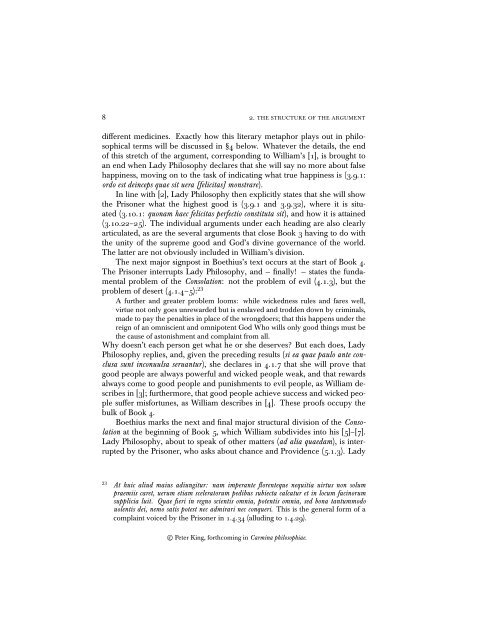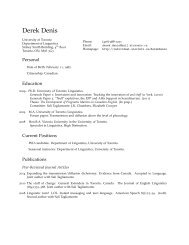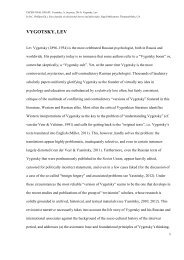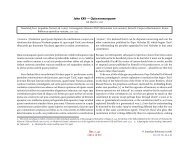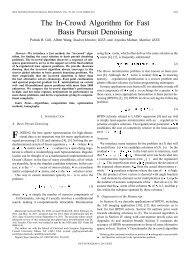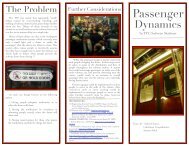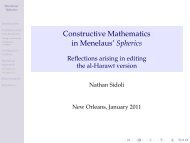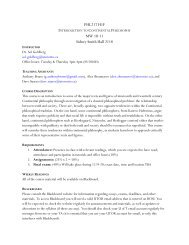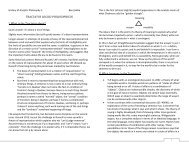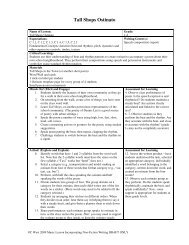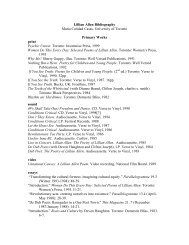BOETHIUS: FIRST OF THE SCHOLASTICS* - University of Toronto
BOETHIUS: FIRST OF THE SCHOLASTICS* - University of Toronto
BOETHIUS: FIRST OF THE SCHOLASTICS* - University of Toronto
Create successful ePaper yourself
Turn your PDF publications into a flip-book with our unique Google optimized e-Paper software.
8 2. <strong>THE</strong> STRUCTURE <strong>OF</strong> <strong>THE</strong> ARGUMENT<br />
different medicines. Exactly how this literary metaphor plays out in philosophical<br />
terms will be discussed in §4 below. Whatever the details, the end<br />
<strong>of</strong> this stretch <strong>of</strong> the argument, corresponding to William’s [1], is brought to<br />
an end when Lady Philosophy declares that she will say no more about false<br />
happiness, moving on to the task <strong>of</strong> indicating what true happiness is (3.9.1:<br />
ordo est deincepsquae sit uera [felicitas] monstrare).<br />
In line with [2], Lady Philosophy then explicitly states that she will show<br />
the Prisoner what the highest good is (3.9.1 and 3.9.32), where it is situated<br />
(3.10.1: quonam haec felicitas perfectio constituta sit), and how it is attained<br />
(3.10.22–25). The individual arguments under each heading are also clearly<br />
articulated, as are the several arguments that close Book 3 having to do with<br />
the unity <strong>of</strong> the supreme good and God’s divine governance <strong>of</strong> the world.<br />
The latter are not obviously included in William’s division.<br />
The next major signpost in Boethius’s text occurs at the start <strong>of</strong> Book 4.<br />
The Prisoner interrupts Lady Philosophy, and — finally! — states the fundamental<br />
problem <strong>of</strong> the Consolation: not the problem <strong>of</strong> evil (4.1.3), but the<br />
problem <strong>of</strong> desert (4.1.4–5): 23<br />
A further and greater problem looms: while wickedness rules and fares well,<br />
virtue not only goes unrewarded but is enslaved and trodden down by criminals,<br />
madetopaythepenaltiesinplace <strong>of</strong> thewrongdoers; thatthishappensunderthe<br />
reign <strong>of</strong> an omniscient and omnipotent God Who wills only good things must be<br />
the cause <strong>of</strong> astonishment and complaint from all.<br />
Why doesn’t each person get what he or she deserves? But each does, Lady<br />
Philosophy replies, and, given the preceding results (si ea quae paulo ante conclusa<br />
sunt inconuulsa seruantur), she declares in 4.1.7 that she will prove that<br />
good people are always powerful and wicked people weak, and that rewards<br />
always come to good people and punishments to evil people, as William describes<br />
in[3]; furthermore, that good peopleachievesuccess andwickedpeople<br />
suffer misfortunes, as William describes in [4]. These pro<strong>of</strong>s occupy the<br />
bulk <strong>of</strong> Book 4.<br />
Boethius marks the next and final major structural division <strong>of</strong> the Consolation<br />
at the beginning <strong>of</strong> Book 5, which William subdivides into his [5]–[7].<br />
Lady Philosophy, about to speak <strong>of</strong> other matters (ad alia quaedam), is interrupted<br />
by the Prisoner, who asks about chance and Providence (5.1.3). Lady<br />
23 At huic aliud maius adiungitur: nam imperante florenteque nequitia uirtus non solum<br />
praemiis caret, uerum etiam sceleratorum pedibus subiecta calcatur et in locum facinorum<br />
supplicia luit. Quae fieri in regno scientis omnia, potentis omnia, sed bona tantummodo<br />
uolentis dei, nemo satis potest nec admirari nec conqueri. This is the general form <strong>of</strong> a<br />
complaint voiced by the Prisoner in 1.4.34 (alluding to 1.4.29).<br />
c○ Peter King, forthcoming in Carmina philosophiae.


